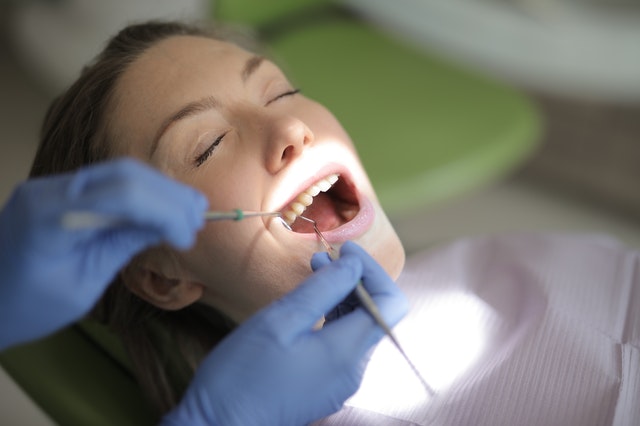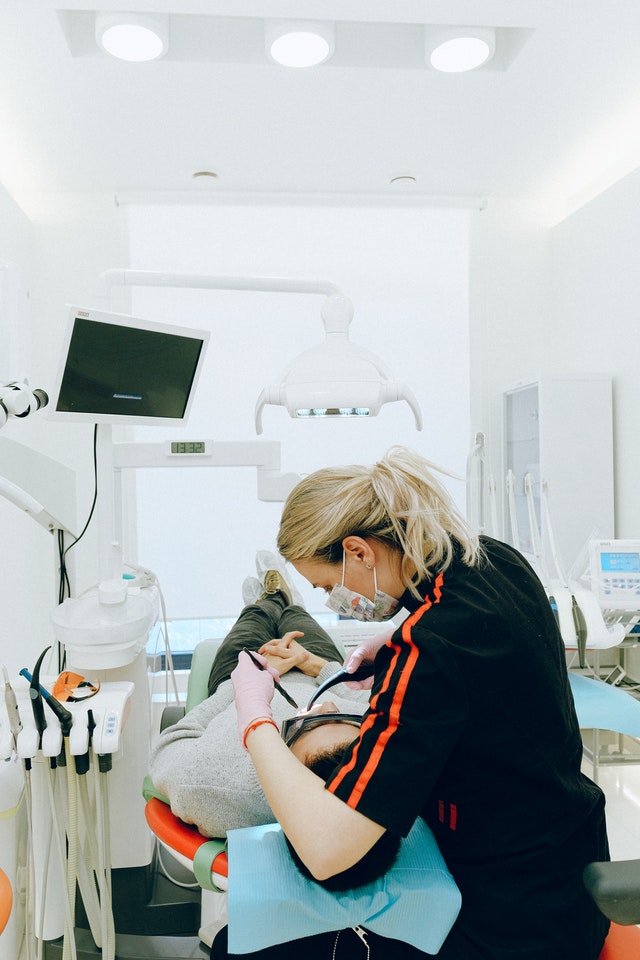
This post is all about Gingivitis Treatment Options, so read it carefully. Gingivitis is an early stage of periodontal disease caused by an inflammatory reaction, which can cause swelling or redness of the gums. Plaque, made up of bacteria, mucous secretions, and food debris, accumulates on the teeth and can lead to gingivitis.
Symptoms of gingivitis are the swelling and bleeding of the gum tissue. If your gums bleed every time you brush your teeth, it may be a symptom of gingivitis. If your gums seem swollen or red, this is another sign. This phenomenon occurs when a sticky layer called plaque builds up on the tooth and the gum.
Plaque is a sticky film created by the food we eat and the bacteria in our mouth. This symptom can also be caused by poor oral hygiene or certain foods such as tea and coffee. Plaque eventually turns into a yellowish compound called “tartar.” This tartar creates toxins that irritate the gums, creates spaces between the teeth and the gums, and creating “pockets” that can inflame deep areas (even bones). This symptom can cause teeth to loosen and even fall out.
What causes gingivitis?
Improper dental hygiene, such as using a toothbrush that is too hard or not flossing or brushing your teeth after taking meal. Remember, your tooth brush can be a weapon, and best options to treat Gingivitis.
Mental stress
Lack of nutrients
Diseases such as osteoporosis or diabetes
Consumption of certain drugs or foods, such as anticoagulants, antibiotics, antihypertensive drugs, immunosuppressants, antiepileptics, tea, coffee, or chocolates.
The Best Natural Home Remedies to fight Gingivitis
Here are some natural remedies for gingivitis . To stay healthy, use these natural and home remedies for gingivitis along with better oral hygiene.
- Make a mixture of hydrogen peroxide and baking soda in equal proportions and brush your teeth with it. Always try to pay attention on the area near the gum line. Baking soda removes plaque, and odors, and makes teeth shiny and whiter.
- Rinse your mouth every night with a mixture of warm water and 1/2 teaspoon salt.
- After lunch or dinner, eat a raw apple.
- Prepare tea with dried mint, anise, 1 teaspoon rosemary and 1 cup of water. Boil the mixture for 10 minutes, pour out the tea, and rinse your mouth with this tea every hour.
- Make a mouthwash with 1 cup of water and 1 teaspoon of cider vinegar and use every morning. You can drink it during meals.
- Rinse your mouth with a tea made by mixing 3 drops of lavender oil and 1 tablespoon of tea in lukewarm water.
- Add a handful of sage leaves to boiling water. Then cover and leave it for cooling down. Now rinse your mouth with this water. This mixture has antibacterial and antifungal effects, which relieves inflammation in the gums and cleans the teeth.
- Add 2 tablespoons of geranium leaves to a cup of boiling water. Let it brew for 15 minutes, then pour out the liquid and use it to rinse your mouth twice a day.
- Add 2 tablespoons of dried mallow root to a cup of water and boil for 5 minutes. Rinse your mouth several times a day when the water is warm.
- Mix half a cup of berries, half a cup of milk, 1 teaspoon of vanilla extract, and cut banana until smooth, then eat it on an empty stomach in the morning. Berries can kill the bacteria that cause gingivitis.
- Add a handful of mango leaves to 1 liter of boiling water. Now cover and made it cooldown. Rinse your mouth once a day with this water.
- Mix 25 ml of honey , 10 drops of lemon juice, and 10 drops of peppermint essence oil, and rinse your mouth every day.
- Heat 1 tablespoon of Arnica, mallow root, and horsetail in a glass of water. Let it sit for 10 minutes, then filter the liquid and add 5 drops of sage essence oil. Put this mixture in a glass container like bottle or jar, cover it, and shake it well to rinse your mouth whenever the gums bleed.
- Mix 30 g of aloe, 30 g of honey, and 10 drops of hydrogen peroxide then rinse your mouth twice a day. With this, rinse your mouth once a day.
- Mix the chopped tomatoes , spinach, parsley, 2 cloves of garlic, and broccoli in a blender, then add a cup of water. Drink this mixture one glass per day.
Treatment of gingival infections with antibiotics
Gingivitis treatment with antibiotics: An antibiotic that contains chlorhexidine can be best Gingivitis treatment options in adults and can be utilized to disinfect the mouth.
We all know that antibiotics play an important role in the body’s immune system in killing germs. The best antibiotic that is absorbed from the gums is tetracycline, but if you need to take antibiotics, amoxicillin is the best option.
Prevention of gum infection
Gum infection and swelling can be easily treated, and by treating it, the early onset of gum disease can be reversed. By following the instructions below, you can restore the condition of your gums and oral cavity by treating the swelling as these are best Gingivitis treatment options for anyone.

Brush with the right technique.
Brush less intensely so that not to damage the tissue around your teeth. Doing so causes the gums to swell. Another thing that experts believe you can do to prevent gum damage is to use soft, nylon bristles. The last thing is to move the toothbrush back and forth with gentle movements.
Follow right method of Flossing
To prevent gum infection, flossing can remove food particles trapped between the teeth. This causes a gradual increase in dental plaque and tartar, the deficiency of either of which leads to disease and swelling of the gums. Floss gently between teeth to prevent swelling. Carefully pull the floss between your teeth and be careful that the floss does not go down and into your gums so as not to damage them.
Mouthwash for gum infection
Gingivitis treatment with mouthwash: Rinsing the mouth removes food particles and debris. As food particles are lost, so are the carbohydrates in the food. Carbohydrates can cause plaque and, as a result, gum disease. So no matter where you are, always and in any place, after every meal, rinse your mouth. It is also important to choose the right chemical formula for your gums. Some mouthwashes (chlorhexidine) kill the bacteria in plaque and reduce the early symptoms of conditions such as gingivitis.
Toothpaste for gum infection
Some toothpastes can find and neutralize plaque around the gum line, thus preventing it from developing before the gums begin to swell. Harmful plaque bacteria around the gums can even destroy tooth enamel. Paying attention to the gums is one of the key points of oral health. Its unique chemical formula finds the exact source of the problem and helps to relieve it quickly by taking care of the gums. Paying attention to the gums is one of the best Gingivitis treatment options.
ALSO READ: Can We Treat Vertigo Without Medication?
Change your diet
A balanced and healthy diet can help improve gum health and treat gum infections. Make sure you have enough vitamin C and calcium in your diet. Adequate consumption of these two greatly reduces the risk of swollen gums.
Reduce your stress level
High stress affects the secretion of hormones, especially cortisol. Cortisol secretion can cause infection and swelling of the gums. Always try to live stress-free life as much as possible.
Surgical Treatment
Root canal treatment
This advanced method of gingival infection cleans deep between your gums and your teeth to the root.
Also for You: The Working Guide Of Medical Jewelry
Gingectomy
It is a type of treatment for gum infection that requires the removal of gum tissue.
Tooth extraction
Although we all believe that permanent teeth are durable, there are many reasons why tooth may need to be extracted. A very common cause involves repairing very damaged teeth from caries. Other reasons include:
If tooth decay or damage spreads to the pulp, bacteria in the mouth can enter the pulp and lead to infection. This can often be treated with root canal treatment, but if the infection is so severe that it is not treated with antibiotics or RCT, tooth extraction may be needed to prevent the infection from spreading.
Flap surgery
Flap surgery can be a best Gingivitis treatment options, if your gum disease is severe, as it may include bone or tissue transplants.
Final words
If you have swelling and infection of the gums, you should first see a dentist for diagnosis and treatment. In ignored cases, gingivitis can cause the gums to separate from the teeth. This can damage the soft tissue and bone that supports the tooth and may also cause the tooth to loosen. If the infection progresses, you may eventually lose your tooth or need a dentist to remove it.
At last, if you like this article “Best Gingivitis Treatment Options in Adults” then consider to share it in your social profile.

